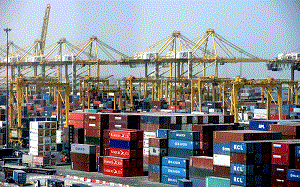
U.A.E.’s non-oil trade reached AED 256 billion in the first quarter of 2014 reflecting the continuous momentum of U.A.E’s non-oil foreign trade in 2013, driven by stronger performance in all economic sectors and the country’s more advanced position on many global indices, preliminary data of the Federal Customs Authority (FCA) showed on Tuesday.
“FCA’s statistics show that imports accounted for 65%, or AED 166.4 billion of the non-oil trade in the first quarter, while exports accounted for 11.8%, or AED 30.2 billion and re-exports that represented 23.2%, or AED 59.4 billion of non-oil trade,” FCA said in a press release affirming that U.A.E. has continued to enhance its prime position on the world trade map and enhance the role it plays in facilitating trade across the world in the first quarter of this year.
U.A.E.’s non-oil trade in terms of weight reached approximately 40.7 million tonnes in 1Q14, of which imports accounted for 15.5 million tonnes, exports 22.7 million tonnes and re-exports 2.5 million tonnes.
FCA said the first-quarter statistics represent a significant launchpad for U.A.E.’s trade balance with other countries, after the foreign trade indices returned last year to the normal levels of pre-global financial crisis era that hard-hit the world in 2008.
The country’s federal customs regulator added that the non-oil trade in 2013 saw relative steady growth rates throughout the year, which in turn mirrors the sound economic and trade policies of U.A.E.
In the first quarter of 2014, Asia-Pacific and Australia region maintained its leading position among the U.A.E.’s trade partners in terms of non-oil trade, accounting for 43%, or AED 106 billion of total direct trade volume.
The remaining regions maintained their relative weight in terms of total trade during the first quarter, as Europe took the second position contributing 27%, or AED 67.2 billion to total trade, followed by the MENA region with 14%, or AED 35.1 billion.
The US and Caribbean ranked forth with 10% of the total non-oil trade, or AED 24.1 billion, followed by West and Central Africa (4%, or AED 9.4 billion) and East and South Africa (3%, or AED 7 billion).
Based on the FCA figures, the value of non-oil trade between U.A.E. and Gulf Cooperation Council (GCC) reached AED 22.9 billion in 1Q14, of which GCC imports accounted for AED 7.4 billion, while exports and re-exports represented AED 7.7 billion each.
The GCC countries maintained their relatively flat positions among trade partners of the U.A.E., with the Kingdom of Saudi Arabia on top.
The total value of U.A.E.-Saudi non-oil trade recorded AED 8.3 billion, accounting for 36.2% of total trade with the GCC countries. Oman came second with AED 6 billion (26.4%), followed by Kuwait and Qatar with AED 3.2 billion (14%) each, and finally Bahrain with AED 2.2 billion (9.4%).
Non-oil trade with Arab countries hit AED 35.9 billion in the first quarter, to which imports contributed AED 11.9 billion, exports and re-exports AED 11.7 billion and AED 12.3 billion, respectively.
FCA said gold, motor vehicles, diamond, jewels and jewelry, telephone sets, aerial and space vehicles, data processing devices, pure copper and copper mixes were on top of U.A.E.’s imports in 1Q14.
Gold, jewels and jewelry, ethylene polymers, crude aluminum, copper wires, petroleum oils and processed mineral oils, iron scrap, sugar cane or sugar beet came at the first place in the list of exports.
Top re-exports in the said period were diamond, jewels and jewelry, motor vehicles, mobile sets, reciprocating engines, data processing devices, magnetic and optical readers and transport trucks.
“U.A.E. is keen on facilitating world trade and removing customs and non-customs hiccups before mutual trade with peers worldwide. This in turn would cement bilateral international relations, contribute to meeting national expectations and consumer growing demand while the U.A.E. seeks to protect the society from illegal trade practices and maintain the economic interest of the business sector locally and overseas, the FCA said.
In its 2014-16 strategy, co-implemented with the local customs departments and competent ministries, the FCA is keen on increasing the competitive edge of the State in several customs related-fields. The regulator targets over three years to develop the customs procedures in terms of facilitating mutual trade, enhancing competitiveness, backing the customs departments in their inspection efforts to enhance the society security, strengthening customs relations with other states and international organisations and ensuring that all http://www.businesstoday.me/wp-content/uploads/2022/12/sample10.jpgistrative services are offered in compliance with the standards of quality, efficiency and transparency.
FCA adopts many initiatives to achieve growth in the U.A.E.’s non-oil trade and facilitate trade, mainly developing customs procedures and policies, developing electronic systems, reducing the time of customs clearance, managing customs setoff, providing statistical data, overcoming obstacles to mutual trade, conducting international studies on the best standards, providing customs training and bolstering competitive indexes in the customs field.
Eight competitive indexes were defined in compliance with FCA’s strategy and initiatives were developed for the enhancement, namely the indexes of customs management efficiency, import and export efficiency, cross-border trade, the number of import days, number of the documents required for import, number of export days, and number of the documents required for export and customs department performance index.
Steps are being taken to implement the initiatives aimed at development of the inspection and surveillance policies and procedures, early inquiry about shipments, risk system management, the U.A.E. green customs, building customs department capacities in the field of crisis management and entering into regional and international agreements and organizations.
Source : WAM News Agency for United Arab Emirates












